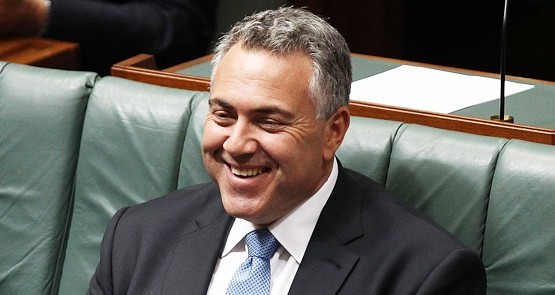When’s a new tax not a tax? Well, that’s one of the issues that bedevilled the government last year as it contorted itself into ever-more absurd positions trying to justify broken promises and tax hikes.
This week, the Prime Minister and his brains trust were trying to prevent that entire problem from ever happening in this year’s budget, by indicating there’d be no new taxes or tax increases of any kind next week. Taxes, you see, are what Labor imposes, whereas the Coalition is all about cutting taxes. This was portrayed by The Australian as a “shrewd trap” for Labor, which has publicly embraced measures to reduce multinational tax avoidance and the extraordinarily generous superannuation tax concessions to high earners, both of which are electorally popular. Somehow, that would be transmogrified into an electoral winner for Abbott.
There were a couple of problems with that “shrewd trap”. One, as we noted earlier this week, is that the Coalition plans to impose a tax burden on the economy that, in terms of tax:GDP, will be significantly higher than what Labor imposed while it was in government. Another was that Joe Hockey has been, until recently, trying to conduct a vaguely sensible debate on tax reform. Hockey has at various stages floated a “Google tax” aimed at profit-shifting multinationals — indeed, he said the government was drafting it — and called for bipartisan consensus on addressing super tax concessions, which by 2017 are forecast to cost us around $50 billion in lost revenue a year.
Both of those ideas have been shut down by Abbott now as part of his “shrewd trap”.
Enter someone whose sensibilities can’t be as easily dismissed as Joe Hockey’s. Rupert Murdoch has made clear that he sees streaming video services as a substantial threat to the one commercially viable part of his walking dead old media company, News Corp — Foxtel. Foxtel, once an innovative, constantly growing force under Kim Williams, is desperately playing catch-up in streaming with its rather limp Presto offering in the face of the growing power of US giant Netflix. Last year, Foxtel CEO Richard Freudenstein demanded that Netflix be forced to stop Australians from accessing its US service. And a few weeks ago, Murdoch’s local spear carrier, News Corp head Julian Clarke, demanded that the government force Netflix to pay GST for its recently launched Australian service.
The government was eager to comply. Joe Hockey took the proposal for an online intangibles extension to the GST to state premiers shortly afterward, and a report by Fairfax’s Peter Martin today confirms the government will not merely impose GST on Netflix in the budget, but also try to impose it on virtually all online transactions, tangible and intangible, even if that ends up losing money for taxpayers because of the massively increased cost of GST enforcement. What’s overlooked by advocates of imposing the GST on online purchases from overseas is that, as the Productivity Commission found, it will be exorbitantly expensive to impose the kind of collection process favoured by big local retailers. Extending GST collection to virtually everything ordered online will mean massive surveillance and monitoring of what Australians are ordering on the internet.
When it comes to profit-shifting by multinationals through dodgy internal transactions, bogus IP licensing, trading hubs and tax havens, the government has decided to take no action to improve the integrity of our tax systems and recover billions in lost revenue. But in the one area where Rupert Murdoch has demanded they take action to hurt one of his competitors, the government has moved swiftly to impose a tax on a multinational. Coincidence? If so, one that’s all the sweeter given News Corp is itself one of Australia’s biggest tax dodgers.
Naturally, this will be dressed up as an “integrity measure” and a “level playing field”, rather than a tax increase, to enable the government to insist that it’s the party of lower taxes. But there’ll be no “level playing field” for local companies paying the full corporate tax rate against offshore competitors paying a fraction of it.
Nevertheless, this is consistent with the government’s crony capitalism. If you’re on the government’s list of mates, it will bend over backwards to help you — especially if consumers are doing the wrong thing and need to be encouraged back to use your goods and services.









I subscribed to a VPN service to avoid being spied upon by this fascist government. It looks like it will save me money in GST on overseas purchases as well. What a bonus!
And a 10% surcharge will not make much of a dent in overseas online purchases as the prices are often so much lower.
I recently bought a TDS meter for a delivered price about a quarter of the Aus retailers’ non-delivered price.
And thus the Liberal party, Murdoch and their pals continue to show their exceptional ignorance as to how the Internet works and how it fundamentally changes our economy, jobs, media, education, communication, freedom, privacy and so on.
I already pay a Netflix tax, it’s called a VPN, good value at about 5.00AUD per mth. Murdoch can eat one.
“Limited News Party”.